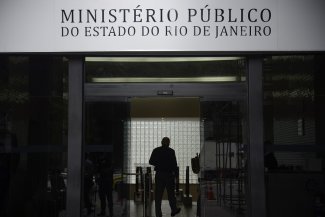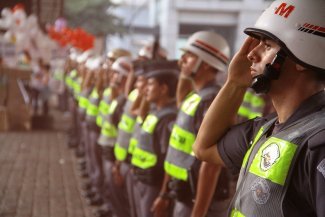A mother of five children, Gilvania Reis Gonçalves lost her job as a salesperson in a clothing shop. In order to feed her family, she began selling tapioca pancakes outside a metro station on the outskirts of São Paulo in 2019. She has been the spokesperson for the Movement of Workers Without Rights since its creation in May 2022.
The Casa do Trabalhador (Worker’s House) in the city of São Luís is a shadow of its former self. More than half of the 43 sectoral unions that once occupied the large building with decaying yellow walls in the north-eastern state of Maranhão have closed their doors. “They had to close down due to a lack of funds after the reform,” explains a volunteer for the hotel and restaurant workers’ union Sindehotéis-MA, one of the few entities that continue to operate there as best they can. “There are still representatives of domestic workers, civil servants and petrol station workers,” says the retired worker who occasionally volunteers his time to help out his former union.
Most unions lost 99 per cent of their financial resources almost overnight and have only been able to carry on thanks to the dedicated work of volunteers. The far-reaching changes made to Brazil’s labour code over the last five years have significantly diminished the ability of unions to advocate for workers – at the very moment workers needed their unions the most.
It all started in July 2017, when a government with no democratic legitimacy voted through a fast-track procedure to amend 117 articles and 200 terms of the Consolidação das Leis do Trabalho (Consolidation of Labour Laws, CLT), which dates from 1943.
Michel Temer, Brazil’s former vice-president who became president after Dilma Rousseff was removed from office the prior year, set out to tackle the country’s economic crisis by making the labour market and collective bargaining “more flexible”. He promised to create six million jobs over ten years.
Five years later, on the eve of the country’s second round of presidential elections, the picture for working people in Brazil is anything but rosy. While it’s true that a recession and the health crisis have hit the economy hard, causing unemployment and informal work to soar, many experts agree that the labour code reform and the subsequent policies of President Jair Bolsonaro have done the most damage to workers’ rights.
In 2022, the International Trade Union Confederation ranked Brazil among the “10 worst countries in the world for working people”. In its January 2022 report on workers’ rights and social protection, the OECD (Organisation for Economic Co-operation and Development) writes that “Brazil is far from being in alignment with [the] values, standards and obligations” required to accede to the organisation, due among other things to its “failures to protect the human rights of workers”.
2017-2022: a bleak period for workers’ rights
The consequences of the labour law reform are too numerous to list in their entirety. In almost every instance, however, workers have seen their rights weakened: dismissal procedures have been facilitated; temporary contracts with no guarantee of minimum income have been introduced; subcontracting, which reduces employer responsibility and fragments the workforce, has been expanded; the hierarchy of norms in collective agreements has been inverted; free access to labour justice has been restricted…and the list goes on.
According to a 2019 report by the Network for the Study and Monitoring of Labour Reform (REMIR-Trabalho), the current legislation largely favours employers. “What we saw in our study is that all of these reforms have more or less the same goal: decreasing worker protections in order to reduce the cost of labour and give employers more freedom to define contractual rules and remuneration,” says labour economist José Dari Krein, coordinator of REMIR-Trabalho and a member of Centre for Studies in Trade Unionism and Labour Economics (CESIT).
But even as the reform has eroded worker protections, it remains unclear whether it has brought any real macroeconomic benefits. ‘Flexibilisation’ has not energised the labour market and the country has failed to improve its notorious labour productivity deficit.
Brazilians have not seen an increase in their average income, which has hovered around 2,700 reais a month (approximately US$505) for the last five years, even as inflation reached 30 per cent during the same period. Brazil went from nearly full employment in 2014 (4.8 per cent unemployment) to 10 per cent unemployment by 2016. In 2021, unemployment peaked at 14.7 per cent, one of the highest rates among the G20 countries. “That being said, it should be kept in mind that unemployment figures may be higher because many of the jobs created are informal. Faced with a lack of alternatives, people start their own businesses, 80 per cent of which are undeclared,” says Dari Krein, who believes that the reform has “encouraged more precariousness”. According to the Brazilian Institute of Statistics (IBGE), almost 40 per cent of the working population have no employment contracts or social protection. While the national figure is already alarming, the number is as high as 60 per cent in some states in the Northeast Region. Finally, workplace accidents, forced labour and child labour have not decreased over the last five years; quite the contrary.
As a federal deputy, Jair Bolsonaro supported Michel Temer’s reform. As president, Bolsonaro, whose administration (2018-2022) includes ultraliberal economics minister Paulo Guedes, has pushed through a number of legislative and administrative changes denounced by workers’ rights advocates. Occupational safety and health protection standards have been relaxed, exposing workers to greater danger, labour inspection bodies have suffered drastic budget cuts, while several employer contribution exemptions are depleting social security resources over the long term (Guedes has made no secret of his plans to privatise the pension system, among other things).
Undermining trade unions and social dialogue
The changes to Brazil’s labour legislation have been rapid and far-reaching; most significantly, they have been made without truly consulting workers’ representatives. This was no accident: one of the main attacks on workers resulting from the reform were the changes made to the trade union financing system. Union operations were previously based on two permanent sources of funding: a federal state contribution via a tax and an employee contribution via a mandatory payroll deduction. Defenders of the reform argue that it offers workers the freedom to unionise or not, to choose their union, and frees unions from dependency on the state by encouraging them to ‘land’ their own members and become self-financing.
Apart from the fact that this paradigm shift occurred without any support or a transitional phase, however, implementing self-financing has been made virtually impossible by the lack of human resources needed to carry out the necessary fieldwork, as unions had to abruptly shed many employees. Widespread worker impoverishment has also been a contributing factor. “Those who already don’t earn much struggle to contribute,” says Luís Henrique Perreira da Silva, president of Sindehotéis-MA. “Not to mention the fact that some companies simply do not allow us the access to employees that we need to inform them of our activities,” he explains.
“There was a concerted effort to exclude unions from the democratic life of the country,” says Professor Dari Krein. “The reform has reduced their influence by reducing their power of ratification [of collective conventions] and reducing the scope of collective agreements, and has attempted to cut them off financially by various means.” This, he adds, comes at a political moment in which the government rejects social dialogue and, worse, “constantly seeks to disqualify social movements”.
Explosion of informal work and casualisation
Despite the crippling effects of these reforms, workers’ rights defenders have continued to organise. In May 2022, a coalition of representatives of different categories of low-income workers founded the National Movement of Workers Without Rights (Movimento Nacional dos Trabalhadores Sem Direitos), a grassroots union that brings together street vendors, delivery workers, waste recyclers, domestic and home workers (such as hairdressers and beauty therapists), etc. “There used to be small associations for workers in these categories but they lacked an umbrella organisation. As they work in the informal economy, these workers are unable to form unions within traditional frameworks, by paying contributions for example,” explains Maíra Vannuchi, one of the coordinators.
While still in its early days, the movement has been able to draw from the experience of labour organisations such as the Homeless Workers Movement (MTST, Movimento dos Trabalhadores Sem Teto in Portuguese) and the Union of Workers of the Popular Economy (Unión de Trabajadores y Trabajadoras de la Economía Popular in Spanish), which was born in Argentina and fights for the rights of those excluded from the formal market by neoliberal policies. “It’s about getting back what has been taken away from these workers. They are the ones who keep the economy going,” Vannuchi stresses.
A mother of five children, Gilvania Reis Gonçalves lost her job as a salesperson in a clothing shop. In order to feed her family, she began selling tapioca pancakes outside a metro station on the outskirts of São Paulo in 2019. As Gilvania already had seven years of experience fighting for the right to housing for the unhoused with the MTST, continuing her political commitment by becoming a spokesperson for those without labour rights came naturally.
“We have no rights, yet we work hard. We don’t see the state, because we have no social protection. We only see the state when the police come to take our goods,” she explains.
Gilvania lists the demands for decent work that she is fighting for: a status declared by a sales licence, better public transport infrastructure (buses and the metro, which are indispensable for workers, are often overcrowded and expensive) and, above all, health cover. Speaking from her experience as an informal worker, she adds: “Society’s view must change. We are workers and we need policies that ensure our rights, especially women because we suffer the most.”
While work ‘sem carteira assinada’ (literally ‘without a signature in the booklet’ which records the holder’s labour rights) is at an all-time high, registered workers are often no better off. This has been especially true following the introduction of a new legislative provision that allows people to be hired and paid only for the hours they work, without a guaranteed minimum income and without schedule planning. This so-called ‘intermittent work’ is particularly common in manufacturing, tourism, event planning and the hotel and catering industry, all sectors that have been hit hard by the pandemic and have seen mass layoffs. “Faced with economic uncertainty, employers have given up on taking back their former employees on monthly or even hourly contracts, which at the very least define a number of hours per week in advance,” explains Perreira da Silva.
This leaves workers with no way to plan their working hours or to plan for social support between jobs. If they fall ill, they cannot receive compensated sick leave as they are not part of the company’s staff. Nor can they go on strike. “This is pure exploitation of labour, just like in the last century,” says Perreira da Silva, who has observed this phenomenon among bar workers on the coast of São Luis, a sector that is heavily subject to the fluctuations of the tourist season in the country’s Northeast Region. “By subjecting workers to more flexible working hours, they lose some control over the organisation of their own lives. The reform is based on the idea that economic life should take precedence over social life,” says Darin Krein.
Workers’ rights on the ballot
On 30 October, Brazil will choose a direction for its future. While much is at stake, the presidential election campaign has not focused on serious issues related to the economy, labour or social protection, but rather on invective and falsehoods. Former trade unionist and ex-president Lula da Silva promises to revise the labour code reform – though not to revoke it completely – especially the points concerning access to labour justice and the autonomy of trade unions. He has also cited as a source of inspiration the reforms undertaken by the Spanish socialist government of Pedro Sánchez, which tighten the conditions for the use of temporary contracts and strengthen collective bargaining. According to initial economic data, the unemployment rate has begun to fall and the number of jobs has increased.
Lula’s opponent Jair Bolsonaro, currently running for re-election, is likely to continue down the same path, one that relies on the rhetoric of the deceptively Cornelian choice between “jobs or rights”. His ‘Chicago Boy’ Minister of Economics, Paulo Guedes, recently explained that it is necessary to “choose between a system with many rights and few jobs, or a system with many jobs and chosen rights”. Their programme is based on the proposals outlined in an expert report from November 2021, chief among them the creation of a new form of simplified employment contract that is no longer subject to the CLT (and therefore without the associated rights), with the aim of encouraging rapid hiring. While this work would be declared, workers’ rights would no longer be guaranteed by law but by an agreement reached individually between the employer and the employee.
According to Sérgio Nobre , president of CUT Brasil, the biggest trade union in Brazil and Latin America, the proposals in this report, undoubtedly drawn up “without any participation by legitimate workers’ representatives,” are aimed at “completing the assault on the working class that began with the 2017 reform”.













